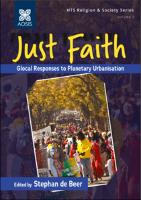Just Faith
Glocal Responses to Planetary Urbanisation
| dc.contributor.editor | De Beer, Stephan | |
| dc.date.accessioned | 2019-04-09 09:33:29 | |
| dc.date.accessioned | 2020-04-01T10:33:53Z | |
| dc.date.available | 2020-04-01T10:33:53Z | |
| dc.date.issued | 2018 | |
| dc.identifier | 1004787 | |
| dc.identifier | OCN: 1100515680 | en_US |
| dc.identifier.uri | http://library.oapen.org/handle/20.500.12657/25312 | |
| dc.description.abstract | The purpose of this scholarly book is to expand the body of knowledge available on urban theology. It introduces readers to the concept of planetary urbanisation, with the view of deepening an understanding of urbanisation and its all-pervasive impact on the planet, people and places from a theological perspective. A critical theological reading of ‘the urban’ is also provided, deliberating on bridging the divide between voices from the Global South and the Global North. In doing so, this book simultaneously seeks out robust and dynamic faith constructs, expressed in various forms and embodiments of justice. The methodology chosen transcended narrow disciplinary boundaries, situating reflections between and across disciplines, in the interface between scholarly reflection and an activist faith, as well as between local rootedness and global connectedness. This was facilitated by the collected gathering of authors, spanning all continents, various Christian faith traditions and multiple disciplines, as well as a range of methodological approaches. The book endeavours to contribute to knowledge production in a number of ways. Firstly, it suggests the inadequacy of most dominant faith expressions in the face of all-pervasive forces of urbanisation, and it also provides clues as to the possibility of fostering potent alternative imaginaries. Secondly, it explores a decolonial faith that is expressed in various forms of justice. It is an attempt to offer concrete embodiments of what such a faith could look like in the context of planetary urbanisation. Thirdly, the book does not focus on one specific urban challenge or mode of ministry but rather introduces the concept of planetary urbanisation and then offers critical lenses with which to interrogate its consequences and challenges. It considers concrete and liberating faith constructs in areas ranging from gender, race, economic inequality, a solidarity economics and housing to urban violence, indigeneity and urbanisation, the interface between economic and environmental sustainability, and grass-roots theological education. | |
| dc.language | English | |
| dc.relation.ispartofseries | HTS Religion & Society Series | |
| dc.subject.classification | thema EDItEUR::Q Philosophy and Religion::QR Religion and beliefs | en_US |
| dc.subject.classification | thema EDItEUR::Q Philosophy and Religion::QR Religion and beliefs::QRV Aspects of religion::QRVG Theology | en_US |
| dc.subject.other | Planetary urbanisation | |
| dc.subject.other | just faith | |
| dc.subject.other | solidarity | |
| dc.subject.other | sustainability | |
| dc.subject.other | urban shalom | |
| dc.subject.other | glocal responses | |
| dc.title | Just Faith | |
| dc.title.alternative | Glocal Responses to Planetary Urbanisation | |
| dc.type | book | |
| oapen.identifier.doi | 10.4102/aosis.2018.BK87 | |
| oapen.relation.isPublishedBy | d7387d49-5f5c-4cd8-8640-ed0a752627b7 | |
| oapen.imprint | 2 | |
| oapen.series.number | 03 | |
| oapen.pages | 398 | |
| oapen.place.publication | Durbanville | |
| oapen.identifier.ocn | 1100515680 |

